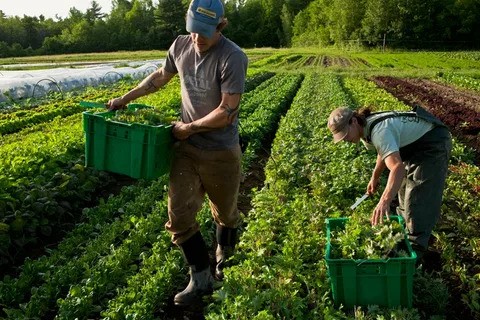Italy Farm Jobs
Italy is a country celebrated for its art, culture, and culinary delights—and its agricultural heritage is no exception. The rolling vineyards of Tuscany, the olive groves of Puglia, and the sun-drenched citrus orchards of Sicily all tell a story of a long tradition of farming that continues to thrive today. Farm jobs in Italy not only offer a chance to work amidst breathtaking landscapes and rich history but also provide opportunities to be part of a vibrant community deeply connected to the land.
In this extensive guide, we explore the various aspects of farm work in Italy. We’ll delve into the diverse types of jobs available, the skills and training required, the challenges and rewards of rural life, and the trends shaping the future of Italian agriculture. Whether you’re a local seeking a career change or an expatriate looking for a taste of authentic Italian life, this guide will help you understand the world of farm jobs in Italy.
The Rich Agricultural Heritage of Italy
Italy’s agriculture is as diverse as its regions. The country’s unique geography and climate have nurtured an agricultural sector that produces some of the world’s finest wines, cheeses, olive oils, fruits, and vegetables. Agriculture has long been an integral part of Italian culture, deeply intertwined with local traditions and family values. Today, despite modern challenges, the sector remains a cornerstone of Italy’s economy and identity.
Regional Specializations
Each region in Italy brings its own flavor to the agricultural landscape:
- Tuscany and Umbria: Famous for vineyards, olive groves, and the production of high-quality wine and olive oil.
- Sicily and Southern Italy: Known for citrus orchards, almond groves, and the cultivation of exotic fruits and vegetables.
- Northern Italy: Home to dairy farms, rice paddies in the Po Valley, and a mix of crop production that supports both local consumption and export.
- Puglia and Basilicata: Renowned for their extensive olive groves, wheat fields, and production of durum wheat, a key ingredient in pasta.
This regional diversity creates a wide spectrum of opportunities for those interested in pursuing farm jobs, whether in traditional settings or modern, technology-driven environments.
Types of Farm Jobs in Italy
The Italian farming sector offers roles that cater to a range of skills and interests—from hands-on agricultural work to managerial and technical positions. Here are some of the most common types of farm jobs in Italy:
1. Crop Production and Horticulture
Farmers in Italy cultivate a variety of crops, and roles in crop production vary widely depending on the type of agriculture:
- Vineyard Workers: Italy is synonymous with wine, and working in vineyards involves tasks like pruning, harvesting grapes, and maintaining vines. These roles require physical stamina and a passion for winemaking.
- Olive Grove Assistants: Olive oil is a staple of Italian cuisine, and jobs in olive groves include harvesting, sorting, and sometimes processing olives. This work is often seasonal, providing opportunities for temporary employment.
- Vegetable and Fruit Farm Workers: From tomato farms in the south to apple orchards in the north, workers in these fields are responsible for planting, tending, and harvesting a variety of produce. These positions often involve both manual labor and basic technical tasks related to irrigation and pest control.
2. Livestock and Dairy Farming
Italy’s dairy and livestock sectors are renowned for producing high-quality cheeses and meats. Jobs in this area include:
- Animal Caretakers: These professionals are responsible for the daily care of livestock, including feeding, health monitoring, and general husbandry. Their work ensures the wellbeing of animals and the quality of dairy and meat products.
- Dairy Farm Workers: In dairy farms, workers assist with milking, cleaning, and maintenance of dairy equipment. Attention to hygiene and animal welfare is paramount in these roles.
- Ranch and Herd Managers: Experienced professionals may take on supervisory roles, managing the operations of large livestock farms and ensuring that all aspects of production run smoothly.
3. Agribusiness and Technical Roles
Modern agriculture in Italy isn’t just about traditional farming techniques; it also incorporates technology and business acumen:
- Farm Managers and Supervisors: These roles involve overseeing the entire operation of a farm, from production schedules and budgeting to staff management. Farm managers ensure that all processes run efficiently and sustainably.
- Agricultural Technicians: With the growing integration of technology in agriculture, technicians are needed to maintain equipment, manage precision farming tools, and implement data-driven farming practices.
- Marketing and Sales Professionals: Many farms, especially those producing high-end products like wine and olive oil, require skilled marketing professionals to promote their goods both locally and internationally.
4. Seasonal and Temporary Positions
Seasonal work remains a significant aspect of the Italian agricultural landscape. During peak harvest periods, farms often hire temporary workers, providing flexible opportunities for students, backpackers, and those looking to supplement their income.
- Harvest Workers: These roles are critical during the harvesting season and involve intensive manual labor, often under tight deadlines.
- Packaging and Processing Assistants: In addition to fieldwork, there are jobs in processing plants where produce is cleaned, sorted, and packaged for market.
Skills, Training, and Qualifications
Working on an Italian farm requires a mix of practical skills, technical knowledge, and an appreciation for the local culture. Here are some of the key requirements and pathways for those interested in pursuing a career in agriculture:
Educational Pathways
- Vocational Training and Agricultural Schools: Italy has several agricultural institutes and vocational schools that offer courses in farming techniques, animal husbandry, and sustainable agriculture. These programs provide hands-on training and are an excellent entry point for aspiring farmers.
- University Degrees: For those interested in higher-level positions or agribusiness, degrees in agricultural science, agronomy, or food technology can be highly beneficial. Universities in Italy and across Europe offer specialized programs that combine theoretical knowledge with practical applications.
- Apprenticeship Programs: Many farms offer apprenticeship opportunities that allow individuals to learn directly from experienced farmers. These programs are particularly valuable for acquiring traditional skills and understanding the nuances of local agriculture.
Essential Skills
- Physical Stamina: Farming is often physically demanding. The ability to work long hours in outdoor environments is crucial.
- Technical Proficiency: Familiarity with modern farming equipment and sustainable practices is increasingly important. This includes an understanding of irrigation systems, pest control, and the use of digital tools in agriculture.
- Language and Communication: Proficiency in Italian is generally required, especially in rural areas. However, knowledge of other languages can be an asset, particularly for farms that cater to international markets.
- Adaptability and Problem-Solving: Agriculture can be unpredictable due to weather conditions and market fluctuations. The ability to adapt and solve problems on the fly is essential.
- Cultural Sensitivity: Understanding local traditions and working within the context of Italian rural life is important for building successful working relationships on farms.
The Lifestyle of a Farm Worker in Italy
Working on a farm in Italy isn’t just a job—it’s a way of life. The rural setting offers a unique blend of community, tradition, and connection to nature that is hard to find in urban environments.
Daily Life on the Farm
Farm work in Italy often starts early in the morning and can last until the late afternoon or early evening. The work is seasonal, which means that while some periods are extremely busy (such as harvest time), other times of the year may be quieter. This seasonal rhythm allows workers to enjoy periods of rest and engage with local community events or traditions.
Community and Family Ties
Italian farms are often family-run, and there is a strong sense of community among workers. The bonds formed in these close-knit environments can be a source of support and camaraderie. Many farm workers also enjoy the rich cultural traditions of rural Italy, from local festivals to communal meals, which enhance their overall quality of life.
Living Conditions and Perks
While rural life can be peaceful and fulfilling, it also comes with its challenges. Housing might be modest, and modern conveniences can be less readily available than in urban centers. However, many farms offer on-site accommodation, meals, and other benefits as part of the employment package. The lower cost of living in rural areas can also help offset some of these challenges.
Challenges Facing the Italian Agricultural Sector
Despite the many opportunities, the agricultural sector in Italy faces a number of challenges that impact job seekers and workers alike:
Economic and Market Pressures
- Seasonal Income: The seasonal nature of many farm jobs means that income can fluctuate significantly throughout the year. Workers often need to plan financially for periods of lower activity.
- Market Volatility: Global market trends, changes in consumer demand, and economic fluctuations can affect farm profitability and job stability.
- Competition: There is a growing demand for skilled workers in agriculture, and competition for the best positions can be fierce.
Regulatory and Environmental Issues
- Bureaucracy: Navigating agricultural regulations, land use policies, and environmental standards can be complex, particularly for small family-run farms.
- Sustainability Pressures: There is increasing pressure to adopt sustainable practices in agriculture. While this is positive for the environment, it often requires significant investment in new technologies and training.
- Climate Change: Italy, like many other countries, is facing the impacts of climate change. Unpredictable weather patterns, droughts, and other environmental factors can disrupt farming cycles and affect crop yields.
Future Trends in Italian Agriculture
As with many global industries, Italian agriculture is evolving in response to technological advancements and changing market demands. Here are some trends that are shaping the future of farm jobs in Italy:
Embracing Technology
- Precision Agriculture: The use of sensors, drones, and data analytics is helping farmers optimize crop yields and manage resources more efficiently.
- Automation: New machinery and automation technologies are reducing the physical burden on workers and increasing overall productivity.
- Digital Platforms: Online marketplaces and digital platforms are transforming how farms market their products, reaching broader audiences both locally and internationally.
Sustainable and Organic Farming
There is a growing movement towards sustainable and organic farming practices in Italy. Consumers are increasingly demanding products that are produced in an environmentally friendly and ethical manner. This trend not only helps preserve the natural beauty of Italy’s countryside but also opens up new opportunities for workers with expertise in sustainable agriculture.
Youth Engagement and Innovation
One of the challenges for the agricultural sector is attracting young talent. Initiatives aimed at modernizing the image of farming—through educational programs, government incentives, and innovative projects—are crucial in ensuring the future vitality of Italian agriculture. By blending traditional methods with modern technology, Italy is paving the way for a new generation of farmers who are both skilled and forward-thinking.
Italy Farm Jobs
Farm jobs in Italy offer more than just employment—they provide a deep connection to the land, a chance to uphold centuries-old traditions, and the opportunity to be part of a community that values hard work, sustainability, and cultural heritage. Whether you’re working in the vineyards of Tuscany, the olive groves of Puglia, or the diverse fields of Northern Italy, you become part of a legacy that has shaped the country’s identity for generations.
For those who are passionate about agriculture and eager to embrace the challenges and rewards of rural life, the Italian farm sector is a land of opportunity. With continuous innovations, a growing emphasis on sustainability, and a rich cultural backdrop, the future of farm jobs in Italy is bright. By investing in the necessary skills, seeking out training opportunities, and staying adaptable in a changing environment, you can build a rewarding career that not only supports your livelihood but also contributes to the preservation and advancement of one of Italy’s most treasured industries.
Embrace the challenge, celebrate the tradition, and become part of the enduring story of Italian agriculture—a story where every harvest, every season, and every day brings a new opportunity to cultivate success and grow a better future.



